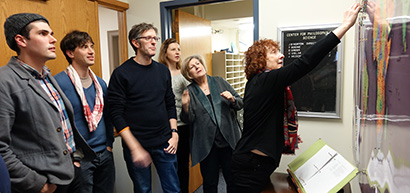FFF: Maria Serban
Featured Former Fellow Lunchtime Talk: Maria Serban, University of East Anglia
The trouble with construct validity
Abstract: An important part in the methodological discourse of psychology focuses on establishing the field as a hard science. The longstanding operationalist tradition emphasised the commitment to experimentalism, to identifying and individuating measurable variables, and to developing local and general theories on the go and on the back of these measurements. However, the growing reputation and interest in psychology was often accompanied by a matching distrust of a science lacking general theories and formal frameworks for explaining the phenomena argued to fall into its domain. To acknowledge the problem of theory avoidance in psychology, the methodological discourse has been expanded with the notion of construct validity. Its main purpose was to flag that in validating the measuring procedures used routinely in psychology one can achieve the theoretical progress desired by many.
This paper challenges the idea that construct validity has played this role of bridging the gap between measurement and theory assigned to it in the general methodological discourse of psychometrists.
I will start with a brief historical overview of how and why the notion of construct validity was introduced in experimental psychology. Then I will situate this notion in the broader methodological discourse of experimental psychology, which will allow me to articulate some challenges facing the practises developed around the notion of construct validity. I illustrate these challenges with the help of two case studies, following the outline of research into general intelligence and memory research. I conclude with some reflections on the proper place of construct validation in the methodological discourse and practices of psychology.
This lecture is an online only event, registration is required. Please register at https://pitt.zoom.us/webinar/register/WN_RG66U8R0QVivD9gZkg0Mmw


 Our last Featured Former Fellows talk of the fall is happening right after Thanksgiving break! These online-only talks occur throughout the year and reunite our Center community with past Fellows from around the globe.
Our last Featured Former Fellows talk of the fall is happening right after Thanksgiving break! These online-only talks occur throughout the year and reunite our Center community with past Fellows from around the globe.